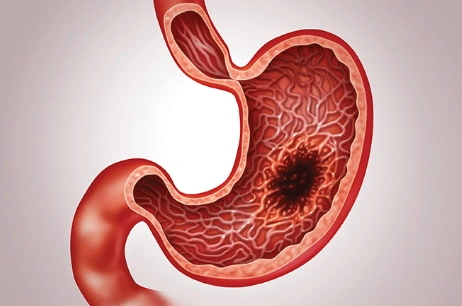Gastrointestinal tract cancer

If you tested your DNA with a personal genomics service like 23andMe, AncestryDNA, FamilyTreeDNA, MyHeritage or another testing company, you can learn more about your risk factors for hundreds of diseases. By clicking the button above ⬆️, you can upload your raw DNA data file and receive a personalized 250-page health report with research links that is the most comprehensive.
The occurrence of gastrointestinal (GI) tract cancers caused by genetic mutations is widespread globally. Although many of these cancers arise spontaneously, there are a few that have a hereditary predisposition and have been well studied. These include Cowden syndrome, MUTYH-associated polyposis, hereditary pancreatic cancer, Lynch syndrome, Peutz-Jeghers syndrome, familial adenomatous polyposis (FAP), attenuated FAP, serrated polyposis syndrome, and hereditary gastric cancer. The identification and characterization of the genes involved in these syndromes have been instrumental in the development of genetic testing for diagnosis and have also contributed to a better understanding of the genetic basis of GI cancers. This review focuses on the current knowledge of the genetics of GI cancers, with an emphasis on heritability and germ line mutations.
The identification and classification of CRC syndromes rely on clinical, pathological, and genetic features. Adenomatous polyps are caused by pathophysiological conditions such as FAP, AFAP, MAP, and Lynch syndrome. PJS and JPS are characterized by hamartomatous polyps. SPS is a unique situation that poses a higher cancer risk and needs to be identified separately. All conditions except for MAP are inherited autosomal dominant disorders, while MAP is autosomal recessive, and SPS is rarely inherited. AFAP and MAP share similarities in their phenotypes, which can cause confusion with Lynch syndrome, sporadic polyps, and other polyposis syndromes.
The presence of specific medical conditions can heighten the likelihood of developing various GI cancers.
Barrett's esophagus occurs when the lining of the esophagus (the tube connecting the mouth to the stomach) is damaged and inflamed by stomach acid (acid reflux). This condition raises the risk of developing esophageal cancer.
Polyps in the colon are often the starting point for colorectal cancer. These abnormal growths inside the intestines can become cancerous, especially if they are larger in size. Fortunately, colon cancer screenings like colonoscopy can identify and remove polyps before they have a chance to develop into cancer.
Anal cancer is associated with specific strains of the human papillomavirus (HPV), a prevalent virus that is transmitted through sexual contact.
Chronic hepatitis C infection has the potential to harm your liver, leading to cirrhosis, which increases the likelihood of developing liver cancer.